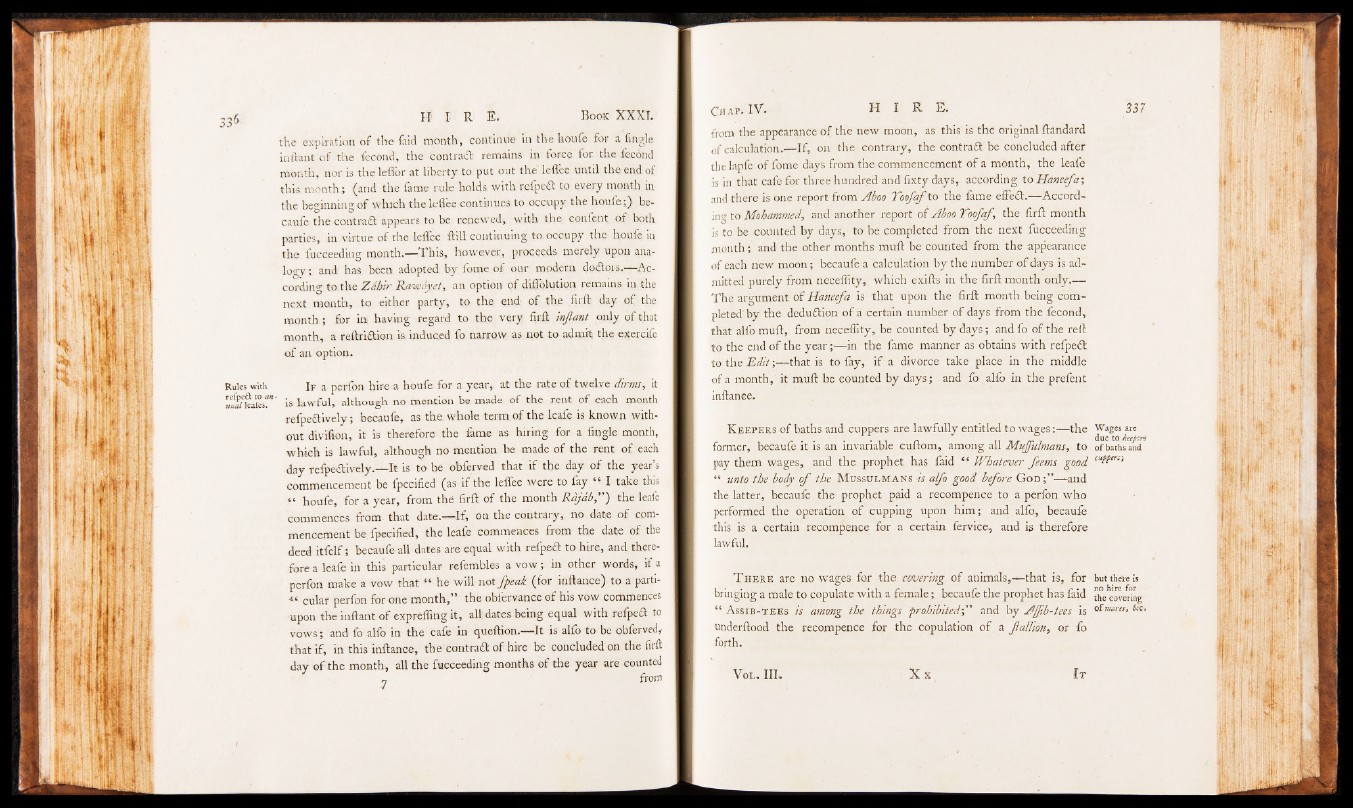
the expiration of the faid month, continue in the houfe for a Angle
iuftant of the fécond, the contracl remains in force for the fécond
month, nor is the leftor at liberty to put out the leftee until the end of
this month ; (and the fame rule holds with É fiflK to every rponth in
the beginning of which the lefl'ee continues to occupy the houle ;.) be-
caufe the contract appears to be renewed;, with the confent of both
parties, in virtue of the lefl'ee ftill continuing to occupy the houfe in
the fucceeding month.— 'This-» however, proceeds merely upon analogy
; and: has been adopted by fome of our modern doctors.— According
to the Yàhir Rawdyet, an option of difiolution remains in the
next month, to either party, to the end of the firft day of the
month- ; for in having regard to the very firft infant only pf that
month, a reftriâion is. induced fo narrow as not to admit the e^ercife
of an option.
Rules with If a pet'fon hire a houfe for a. year, at the rate of twelve dtrms, it
WltafeT is lawful, although no mention be made of the rent of each month
refpeâively ; becaufe, as the whole term of the leaf? is known without
divifion, it is therefore the fame as hiring for a Angle month,
which is lawful, although no mention be made of the rent of each
day refpeâively.— It is to be obferved that if the day of the year’s
commencement be fpecified (as if the lefl'ee were to fay “ I take this
“ houfe, for a year, from thé firft of the month R à jâ b f) the leafe
commences from that date.— -If, on the contrary, no date of commencement
be fpecified, the leafe commences from the date of the
deed itfelf ; becaufe all dates are equal with refpeâ to hire, and therefore
a leafe in this particular refembles a vow ; in other words, if a
perfon make a vow that “ he will not Jpeak (for inftance) to a parti-
«! cular perfon for one month," the obfervance of his vow commences
upon the iuftant of exprefling it, all dates being equal with refpeâ to
vows; and fo alfo in the cafe in queftion.— It is alfo to be obferved,
that if, in this inftance, the contraâ of hire be concluded on the firft
day of the month, all the fucceeding months of the year are counted
y from
from the appearance of the new moon, as this is the original ftandard
of calculation.— If, on the contrary, the contract be concluded after
the lapfe of fome days from the commencement of a month, the leafe
is in that cafe for three hundred and fixty days, according to Haneefa;
and there is one report from Aboo Yoofaf to the lame eftedl.— According
to Mohammed, and another report oft Aboo Yoofqf \ the firft month
is to be counted by days, to be completed from the next fucceeding
month; and the other months muft be counted from the appearance
of each new moon; becaufe a calculation by the number of days is admitted
purely from necelfity, which exifts in the firft month only.—
The argument of Haneefa is that upon the firft month being completed'
by the deduction of a certain number of days from the fecond,
that alfo muft, from necelfity, be counted by days; and fo of the reft
to the end of the year;— in the fame manner as obtains with relpe£t
to the E d it;— that is to fay, i f a divorce take place in the middle
of a month,' it muft be counted by days; and fo alfo in the prefent
inftance.
K eepers of baths and cuppers are lawfully entitled to wages:— the
former, becaufe it is an invariable cuftom, among all Mujfultnans, to
pay them wages, and the prophet has faid ‘ ‘ Whatever feems good
“ unto the body o f the Mussulmans is alfo good before G od and
the latter, becaufe the prophet paid a recompence to a perfon who
performed the operation of cupping upon him; and alfo, becaufe
this ]s a certain recompence for a certain fervice, and is therefore
lawful.
T here are no wages for the covering of animals,— that is, for
bringing a male to copulate with a female; becaufe the prophet has faid
“ Assib-tees is among the things -prohibited;” and by Ajfb-tees is
underftood the recompence for the copulation of a fa llid n , or fo
forth.
X x
Wages are
due to keepen
o f baths and
cuppers\
but the're is
no hire for
the covering
of mares, &C i
Vol. Mi I t